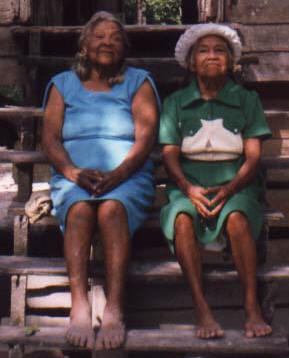

Berbice Dutch Creole
 Berbice Dutch Creole is a language formerly widely spoken in the former Dutch colony of Berbice, which became in the early 19th century part of the British colony of British Guiana, now Guyana. The last speakers of this language were found in the 1970s by Ian Robertson, living on the upper reaches of the Berbice River in and around the area of the Wiruni Creek. One of the last known fluent speakers of Berbice Dutch Creole was Albertha (Bertha) Bell (d. 2005), who was 103 years old when last interviewed by Ian Robertson and a UWI linguistics research team in March 2004.
Berbice Dutch Creole is a language formerly widely spoken in the former Dutch colony of Berbice, which became in the early 19th century part of the British colony of British Guiana, now Guyana. The last speakers of this language were found in the 1970s by Ian Robertson, living on the upper reaches of the Berbice River in and around the area of the Wiruni Creek. One of the last known fluent speakers of Berbice Dutch Creole was Albertha (Bertha) Bell (d. 2005), who was 103 years old when last interviewed by Ian Robertson and a UWI linguistics research team in March 2004.
What is remarkable about this language is that it survived on the upper reaches of the Berbice River, the areas around which the old Dutch colony of Berbice was concentrated prior to a shift to the coast in the late 18th century. One-third of the basic words in Berbice Dutch Creole, including words for 'eat', 'know', 'speak' are of West African origin, from a single language-cluster, Eastern Ijo.
Classifications: Creole, Dutch based. The language also uses Guyanese, which has influenced Berbice considerably.
Comments: SVO. Nearly extinct (SIL)
Dialects: It is claimed to not be inherently intelligible with Skepi or Rupununi. About 30% of the basic lexicon and most of the productive morphology is from Eastern Ijo in Nigeria; most of the rest of the lexicon is from Dutch, 10% loans from Arawak and Guyanese Creole English.
Population: 4 or 5 (1993 S. Kouwenberg). 15 with limited competence (1989 J. Holm).
Region: Berbice River area.
Read article on Berbice Dutch by Kouwenberg, Silvia in Atlas 1996.


